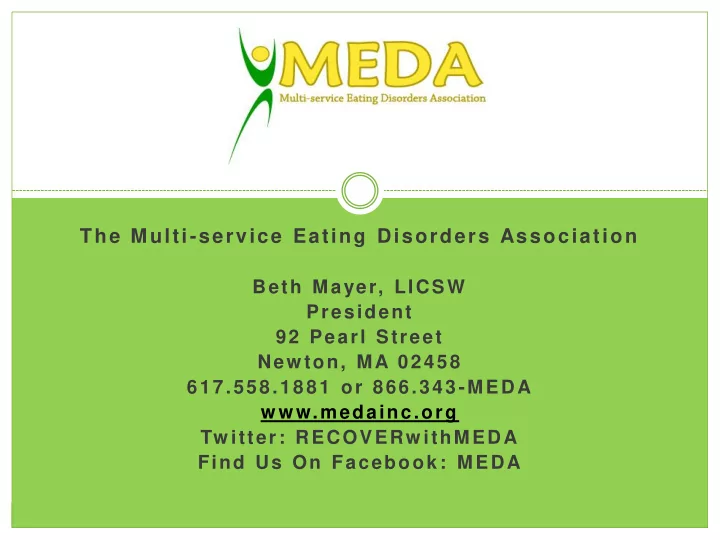

The Multi-service Eating Disorders Association Beth Mayer, LICSW President 92 Pearl Street New ton, MA 02458 617.558.1881 or 866.343 -MEDA w ww.medainc.org Tw itter: RECOVERw ithMEDA Find Us On Facebook: MEDA
MEDA’s Mission MEDA is a non-profit organization dedicated to the prevention and treatment of eating disorders and disordered eating. MEDA's mission is to prevent the continuing spread of eating disorders through educational awareness and early detection. MEDA serves as a support network and resource for clients, loved ones, clinicians, educators and the general public. PURPOSE: M entor the community in its understanding of eating disorders. E mpower individuals to live free of body, food and weight obsessions. D evelop eclectic and diversified treatment teams for clients and their loved ones. A ssist individuals and their loved ones by offering the training and support necessary for recovery.
Program History MEDA was founded in 1994 by Rebecca Manley, MS – celebrating our 20 th anniversary in 2014. MEDA is a national 501(c)(3) non-profit organization Headquarters located in Newton, MA MEDA’s services divided into three branches: 1. Connect to Confidence (Education/Awareness) 2. Connect to Recovery (Treatment and Referrals) 3. Connect to Growth (Professional Development) Programming and services provided to children and adults throughout New England/Nation, regardless of ability to pay
MEDA’s Uniqueness Use of recovered individuals Belief in FULL RECOVERY Low Cost/No Cost – No Insurance Quick, thorough, professional Eating Disorder Prevention and Treatment “Clearinghouse” MEDA’s commitment to not duplicate work already being done by professionals in the area Ultimate goal of organization – to be put out of business
Where To Begin Develop a mission What are your goals/hopes/vision? Do you have a strategic plan to guide you toward accomplishing these goals/hopes/vision? Financial support Grant to start program? Personal investment? What is your bottom line? Invest in 1 nice rack card/brochure People support Get Board Members who are willing to work in the formative years
The Beginning Location Can you work out of home? Leased space? Shared space? Stay within budget! Free Services Bring community in (i.e. Open Hours/Films & Discussions) Open House for professionals/for clients/for families Always come back to the mission (especially early on) Are you living by your mission? Do not stray!
Reach Out Partner Provide education and support Peer groups Topic related speaking engagements Meet the people in your community already doing the work Donation of time for speaking engagements? Group facilitation Groups Free services at first? Build different audiences Fundraising Efforts Think small: car wash, phone-a-thon Think big: NEDA Walk
Grow Your Circle Think outside the box Join Chamber of Commerce Join non-profit list-servs Partner with health and human service organization of city/town Introduce your program to local medical offices and hospitals Call, email and/or meet every one and any one and talk to them about your services Who is supporting your clients? Their families? Yoga teachers, Physical therapists, Acupuncturists GET THESE PEOPLE INVOLVED!
One Goal, One Team Show your community what it means to be part of team Collaborate and communicate on organizational level Leads to concept of team model Teach clinical community importance of collaboration/communication Primary therapist as quarterback Best team: RD, Therapist, MD, Family Therapist, Group Support
MEDA’s Partners Individuals: Organizations: • Therapists • NEDA Network Member • Nutritionists/Dietitians • AED Member • • Psychiatrists Eating Disorders Coalition Member • • Dentists Involved in local iaedp chapter • • Doctors Communicate with BEDA regularly • • Nurses In local community member of Core Management Team in schools • Nurse Practitioners • Treatment facilities nationwide • Acupuncturists • Local hospitals • Yoga Teachers • Massage Therapists • Health and Wellness Coaches • Insurance/Mental Health Lawyers
Recommend
More recommend